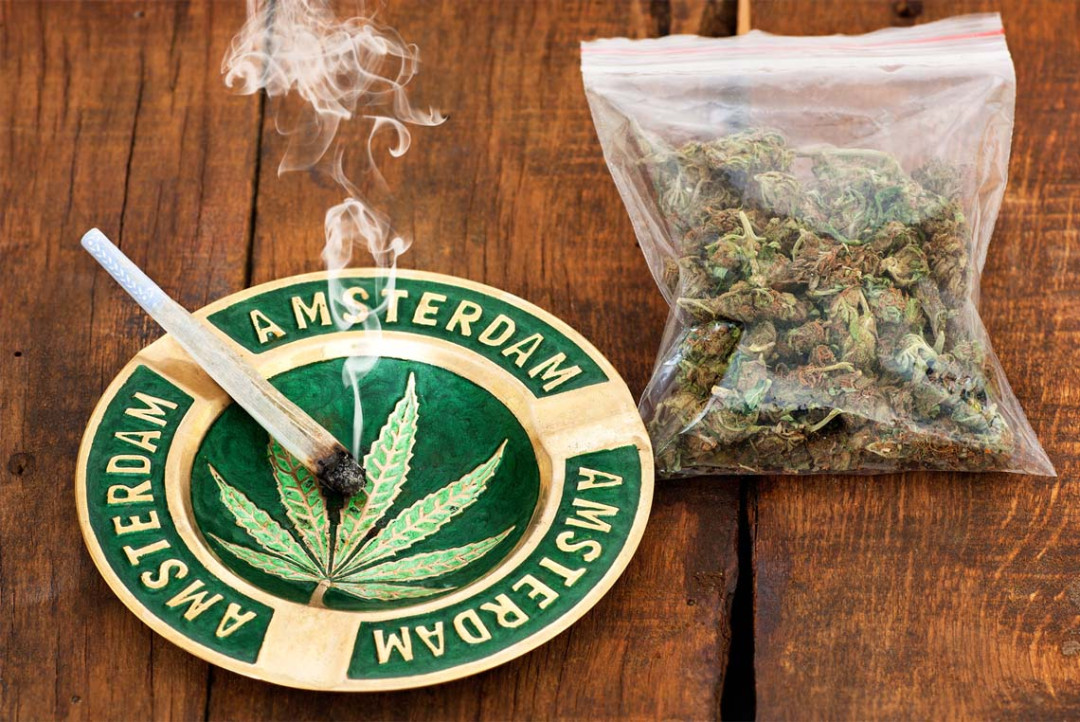Mythbusters: Is cannabis legal in the Netherlands?

Mythbusters takes a closer look at the nuanced drug policy of the Netherlands and finds that, just because you might not get arrested for possession of cannabis, it doesn’t mean that it is legal.
Amsterdam is traditionally viewed as a ‘stoner’s paradise’. A place where pot is legal and the cops can’t do anything to stop you lighting – or even shooting – up. But most people’s knowledge of Netherland’s drug policy comes from the opening scene of Pulp Fiction:
Jules: So, tell me again about the hashbars?
Vincent: Okay, what you wanna know?
Jules: Hash is legal there in Amsterdam, right?
Vincent: Yeah, it’s legal, but it ain’t a hundred percent legal. I mean, you can’t just walk into a restaurant, roll a joint and start puffing away. You’re only supposed to smoke in your homeor certain designated places.
Jules: And those are hashbars?
Vincent: Yeah. It breaks down like this: it’s legal to buy it, it’s legal to own it, and, if you’re the proprietor of a hash bar, it’s legal to sell it. It’s still illegal to carry it around, but that doesn’t really matter ‘cause... get a load of this: if you get stopped by the cops in Amsterdam, it’s illegal for them to search you. I mean, that’s a right the cops in Amsterdam don’t have.
Jules: [laughing] I’m going, that’s all there is to it, I’m fuckin’ going.
Vincent: Yeah baby, you’d dig it the most.
Vincent is only half correct. The Opium Act (1976) of the Netherlands states that cannabis plants are banned. This is in accordance with the many treaties that the country has signed. However, small quantities and small-scale cultivation of cannabis is tolerated.
What the law boils down to is a distinction between ‘soft’ and ‘hard’ drugs. Soft drugs, like cannabis, are tolerated for personal recreational and now medicinal use. Hard drugs, like cocaine and heroin, are not tolerated – from production to consumption.
Toleration for soft drugs only extends so far, and in the case of hashbars or coffee shops, they need to follow some simple rules to continue being tolerated.
They are not allowed to advertise, sell hard drugs, sell to people under 18, sell more than 5 grams per sale, also sell alcohol or be within a certain distance of a school (or the Dutch border).
Each local government area sets the level of toleration exercised by its authorities. Some have stopped coffee shops being within 250 metres of schools while others have pushed that boundary up to 500 metres. Some municipalities have specially marked outdoor areas where cannabis use is tolerated, while others have areas where it is not tolerated.
A recent law change in the Dutch Parliament will mean that coffee shops need to operate as a private club. They will need to have members, their Soft drugs, like cannabis, are tolerated for personal recreational and now medicinal use. Hard drugs, like cocaine and heroin, are not tolerated.
It’s also important to point out that the number of coffee shops is declining, and with the change in law, it is likely that this number will decline further.
There is a public health consideration in tolerating cannabis. As we see in New Zealand, legality is not really a barrier to use. Toleration within narrow boundaries creates a set of conditions that minimise the harm caused to the individual and to society.
Toleration also allows the Netherlands to monitor the health of people who use drugs and provide comprehensive and successful recovery programmes which has seen cannabis use overall decline in the Netherlands over the past decade.
So while Mythbusters loves Pulp Fiction, it looks like Vincent was wrong and potentially responsible for a generation of people thinking cannabis is legal in the Netherlands.
Recent news

Reflections from the 2024 UN Commission on Narcotic Drugs
Executive Director Sarah Helm reflects on this year's global drug conference
What can we learn from Australia’s free naloxone scheme?
As harm reduction advocates in Aotearoa push for better naloxone access, we look for lessons across the ditch.

A new approach to reporting on drug data
We've launched a new tool to help you find the latest drug data and changed how we report throughout the year.

